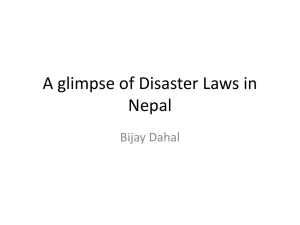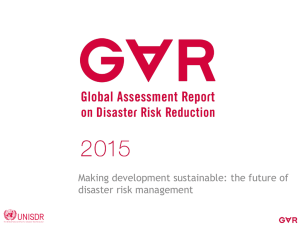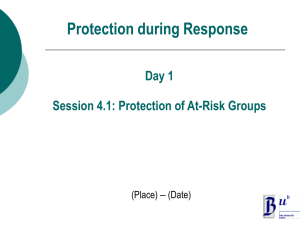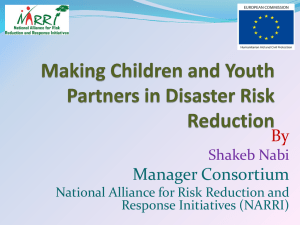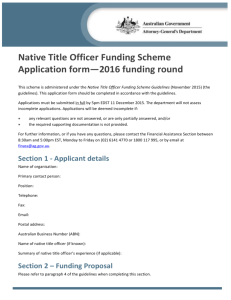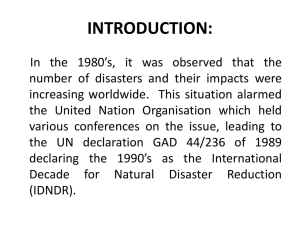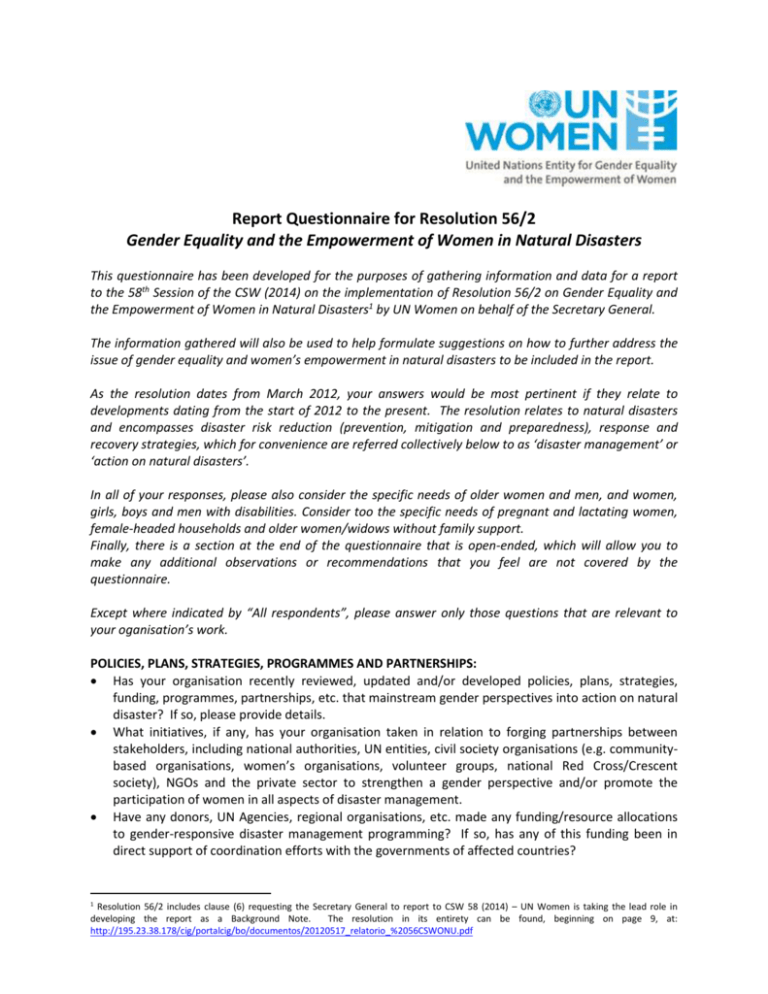
Report Questionnaire for Resolution 56/2
Gender Equality and the Empowerment of Women in Natural Disasters
This questionnaire has been developed for the purposes of gathering information and data for a report
to the 58th Session of the CSW (2014) on the implementation of Resolution 56/2 on Gender Equality and
the Empowerment of Women in Natural Disasters1 by UN Women on behalf of the Secretary General.
The information gathered will also be used to help formulate suggestions on how to further address the
issue of gender equality and women’s empowerment in natural disasters to be included in the report.
As the resolution dates from March 2012, your answers would be most pertinent if they relate to
developments dating from the start of 2012 to the present. The resolution relates to natural disasters
and encompasses disaster risk reduction (prevention, mitigation and preparedness), response and
recovery strategies, which for convenience are referred collectively below to as ‘disaster management’ or
‘action on natural disasters’.
In all of your responses, please also consider the specific needs of older women and men, and women,
girls, boys and men with disabilities. Consider too the specific needs of pregnant and lactating women,
female-headed households and older women/widows without family support.
Finally, there is a section at the end of the questionnaire that is open-ended, which will allow you to
make any additional observations or recommendations that you feel are not covered by the
questionnaire.
Except where indicated by “All respondents”, please answer only those questions that are relevant to
your oganisation’s work.
POLICIES, PLANS, STRATEGIES, PROGRAMMES AND PARTNERSHIPS:
Has your organisation recently reviewed, updated and/or developed policies, plans, strategies,
funding, programmes, partnerships, etc. that mainstream gender perspectives into action on natural
disaster? If so, please provide details.
What initiatives, if any, has your organisation taken in relation to forging partnerships between
stakeholders, including national authorities, UN entities, civil society organisations (e.g. communitybased organisations, women’s organisations, volunteer groups, national Red Cross/Crescent
society), NGOs and the private sector to strengthen a gender perspective and/or promote the
participation of women in all aspects of disaster management.
Have any donors, UN Agencies, regional organisations, etc. made any funding/resource allocations
to gender-responsive disaster management programming? If so, has any of this funding been in
direct support of coordination efforts with the governments of affected countries?
1
Resolution 56/2 includes clause (6) requesting the Secretary General to report to CSW 58 (2014) – UN Women is taking the lead role in
developing the report as a Background Note.
The resolution in its entirety can be found, beginning on page 9, at:
http://195.23.38.178/cig/portalcig/bo/documentos/20120517_relatorio_%2056CSWONU.pdf
CAPACITY-STRENGTHENING
What initiatives, if any, has your organisation undertaken to strengthen the capacity of relevant
authorities and institutions to apply a gender-sensitive approach to disaster management? Please
provide details.
EQUALITY OF ACCESS AND OPPORTUNITY AND THE PARTICIPATION OF WOMEN IN DECISION-MAKING
All respondents: Describe efforts that your organisation has made to ensure that women and men
have full access to:
o Disaster relief assistance and protection
o Early warning systems
o Information, training and formal and informal education on disaster risk reduction and
preparedness.
All respondents: Describe initiatives that your organisation has undertaken to increase women’s
participation and decision-making in disaster management, including on the allocation of resources.
LIVELIHOODS, ECONOMIC OPPORTUNITIES, VOCATIONAL AND TECHNICAL SKILLS TRAINING
Provide details of the initiatives you have taken in the areas of economic relief and recovery and/or
livelihoods programming, income-generating activities or vocational and technical skills training to
ensure that women and men have equal access to participate in such programming, activities and
training.
HUMANITARIAN SERVICES
Describe initiatives with regards to the gender equality implementation of humanitarian services including the provision of food and supplies, WASH, shelter, health (physical, psychological,
emergency health, sexual and reproductive health services) in disaster preparedness and response.
PROTECTION AND GENDER-BASED VIOLENCE
All respondents: describe the actions that your organisation is taking to prevent and respond to
gender-based violence (GBV), including sexual exploitation and abuse by the organisation’s own
staff/contractors/partners.
Describe your work in relation to the provision of medical, legal, psychosocial and other services for
GBV survivors.
INFORMATION AND DATA COLLECTION, ANALYSIS AND USE
All respondents: Please define the criteria used by your organization to identify vulnerable
beneficiaries and households requiring special attention to ensure their equal access to
humanitarian services.
All respondents: Does your organisation or its partners systematically collect, analyse and use data
that is disaggregated by sex, age and disability?
All respondents: Has your organisation assessed and documented its programmes/activities in
natural disasters from a gender perspective? If so, please provide details. And, if so, what, if any,
efforts have been made to disseminate information on good practices, lessons learned, tools
developed, innovation, etc.?
RECOMMENDATIONS AND ADDITIONAL INFORMATION:
Please share any additional information that you feel is relevant.
We welcome any recommendations you may have on how to further integrate the issue of gender
equality and women’s empowerment into natural disaster management.


